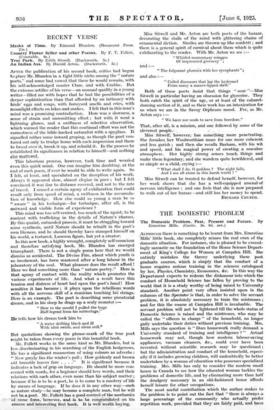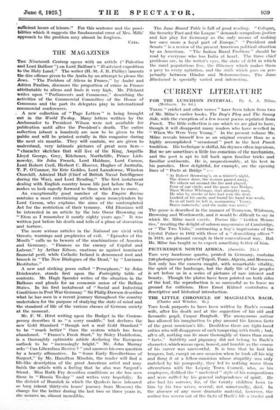THE DOMESTIC PROBLEM
ALTHOUGH there is something to be learnt from Mrs. Ernestine Mills' little book, she completely misses the real crux of the domestic situation. For instance, she is pleased to be exceed- ingly sarcastic on the foundation of the Home Science Depart- ment of King's College for Women at Campden Hill. She entirely mistakes the theory underlying these post graduate courses, which is simply that the conduct of a house requires serious training in the sciences catalogued by her, Physics, Chemistry, Economics, &c. In this way the Department expects to redeem the dishonour into which the conduct of Household Science has fallen by proving to 'the world that it is a study worthy of being raised to University standard. Another point very often insisted upon in the columns of the Spectator is that, in order to solve the servant problem, it is absolutely necessary to train the mistresses ; and for this the course at Campden Hill is invaluable. The servant problem will not be lightened till the whole status of Domestic Science is raised and the mistresses, who may be called the " officers in charge " of the household, no longer gaily undertake their duties without previous training. Mrs. Mills says the question is " Does housework really demand a University standard of training and intelligence ? " Actual housework may not, though how modern labour-saving appliances, vacuum cleaners, &c., could ever have been invented without scientific research may be questioned ; but the administration and conduct of the household, especi- ally if it includes growing children, will undoubtedly be better undertaken by a woman of education who possesses specialized training. Mrs. Mills has only to consider the modern small house in Canada to see how the educated woman tackles the problems of domestic life, and by eliminating more than half the drudgery necessary in an old-fashioned house -affords herself leisure for other occupations.
The most useful contribution which the author makes to the problem is to point out the faet that "there is always a large percentage of the community who actually prefer repetition work, provided that they are fairly paid, and have sufficient hours of leisure." For this sentence and the possi- bilities which it suggests the fundamental error of Mrs. Mills' approach to the problem may almost be forgiven.
CAIA.















































 Previous page
Previous page